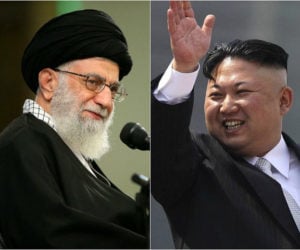 CIA director suggests North Korea may be working another angle with its nuclear ambitions
CIA director suggests North Korea may be working another angle with its nuclear ambitionsDavid Choi Sep. 11, 2017, 8:59 PM
CIA Director Mike Pompeo on Monday said it was "fair to say" that North Korea, which has a history of sharing its nuclear capabilities, could be approached by potential customers, such as Iran, to sell secrets about its missile programs.
"The North Koreans have a long history of being proliferators and sharing their knowledge, their technology, their capacities around the world," Pompeo said in a Fox News interview on Monday.
"As North Korea continues to improve its ability to do longer-range missiles and to put nuclear weapons on those missiles, it is very unlikely, if they get that capability, that they wouldn't share it with lots of folks, and Iran would certainly be someone who would be willing to pay them for it," Pompeo said.
Though the US believes it has solid information on North Korea's capabilities, the reclusive nation's ultimate intent in ramping up its weapons program remains an "incredibly difficult intelligence problem," Pompeo added.
"We think we have an understanding," Pompeo said. "We think Kim Jong Un wants these weapons for protecting his regime and then, ultimately, the reunification of the peninsula. But there's still a lot that the intelligence community needs to learn."
In August, The Washington Post reported that North Korea unexpectedly broke through a major hurdle in its nuclear-missile program after it was able to marry a miniaturized nuclear warhead with a missile. The report led to an increasingly bellicose verbal exchange between President Donald Trump and North Korea, with the hermit kingdom threatening the US territory of Guam.
On September 3, North Korea continued to rattle its global neighbors, conducting its sixth and most powerful nuclear test. Following the test, the UN Security Council unanimously increased sanctions on North Korea - albeit a watered-down version to appease China and Russia - by imposing a cap on crude-oil imports and banning exports of textiles, according to Reuters.
"Look, I worry first and foremost about the threat from North Korea, in the sense that we have a place that is now in the cusp of having the capacity we'd hope they'd never have," Pompeo continued, "with a leader who makes decisions, at the very least, in a very, very tight circle, in which we have limited access."
No comments:
Post a Comment